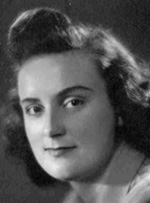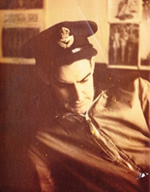Harte & Studer
Margaret “Margie” (Harte) Studer
Born August 28, 1920 in Glace Bay, N.S.
Died August 11, 2007 in Ottawa
 When the three Harte children were starting out in Glace Bay, the question wasn’t so much whether a glass was half full or empty as whether there’d be anything in the glass at all. Poor miner’s kids, orphaned early and gathered into the kindness of
a widowed aunt with seven youngsters and few enough resources of her own, they weathered the Great Depression as much on spirit as substance. Somehow, Margie emerged with a dauntless effervescence: her own glass would always be brimming.
When the three Harte children were starting out in Glace Bay, the question wasn’t so much whether a glass was half full or empty as whether there’d be anything in the glass at all. Poor miner’s kids, orphaned early and gathered into the kindness of
a widowed aunt with seven youngsters and few enough resources of her own, they weathered the Great Depression as much on spirit as substance. Somehow, Margie emerged with a dauntless effervescence: her own glass would always be brimming.
For her, as for many others, military service in World War II was both duty done and a path out. The lively, athletic young airwoman with the quickness to learn and lead caught eyes in the RCAF, among them those of a slender pilot from Northern Ontario.
Margie married H.R. “Bert” Studer in March of 1945. It was for keeps.
Her long sweet middle passage was a time of family and fidelity to her golden rule: “Do good unto others, never mind what they really deserve.” Three sons were taught to play by the rules, to ask the most of themselves and life, to expect positive
results.
Fancying herself a human Swiss Army Knife, Margie was forever unfolding a new skill: assembling that notorious cherry-frosted angel food cake, re-stringing a ball glove with shoelaces, rewiring any lamp you cared to break. Her sunny world view came
with its own language: a person careless with the truth was “full of prunes”, someone awkward and negative “a pill”.
A natural field general, Margie ran the show—and the ever-moving vans—as H.R.’s career took them from the Pentagon to Toronto, from rural Manitoba to Colorado Springs and finally to Ottawa. Equally at home ease making small talk with the brass or
offering counsel to a young airman’s lonely wife, away from for the first time, she made legions of lasting friends.
In her 50s, sons launched, Margie sought an outlet, just a modest niche on the shop floor of Henry Birks and Sons, but instead found herself rising quickly, to become regional manager of china and silver for the firm’s (then) chain of Ottawa stores. And
it wasn’t all toiling for commerce. Once, family legend has it, daylight jewelry robbers had scarcely made their gun-toting getaway when Margie went sleuthing hotfoot after them, looking for their escape route.
Active into widowhood and her 70s and 80s, she turned explorer—hitting southern beaches and European cobbles, crossing Canada with VIA Rail, Ontario by car and Ottawa on foot. Postcards arrived from Mexico, Hawaii, the Canary Islands, and cruise
ships, tracing the path of a human Swiss Army Knife turned perpetual motion machine.
And so it seemed a terrible miscarriage of celestial justice when, in 2004, she was swept in an instant from this abundant vitality into the imprisonment imposed by a severe stroke. Margie’s last years were a difficult test, one she didn’t always
pass, as anger and tears rose up to evidence how keenly she felt just how much she’d lost. Her death, after a brief final illness, cannot have been other than a welcome escape.
But on that final afternoon, had I been able to form the question and she been able to reply, Mum would surely have made one thing clear: anyone who wouldn’t sign up for that adventure again would surely be a real pill.
This essay was written by my eldest brother, David Studer, and appeared in the Globe and Mail’s “Lives Lived” in 2007.
Group Captain Hubert Roy “Bert” Studer, A.F.C., C.D.
Born September 27, 1915 in Callander, Ontario
Died October 12, 1992 in Ottawa
 Born in the midst of World War One, the son of a lumberman, Dad’s early life saw a number of moves around Northern Ontario before the family settled in Capreol, where my grandfather served as Town Clerk.
Born in the midst of World War One, the son of a lumberman, Dad’s early life saw a number of moves around Northern Ontario before the family settled in Capreol, where my grandfather served as Town Clerk.
Although his father had a job, the Depression was “hard times” for my father, his brother, two sisters and my grandparents. Hard times, but not bad times, as the family lived across the street from their maternal grandparents, and saw regular visits from my grandfather’s bachelor brothers – hard working, hard living, diamond drillers who would arrive unannounced, flush with money which was quickly spent on their nieces and nephews.
Completing Grade 12 at 15, Dad returned to school at 17 to take the newly introduced Grade 13. After school, he eventually settled on a career as a construction estimator with a well-known Northern Ontario firm, Hill, Clark, Francis. The outbreak of war found my father a reasonably well off bachelor of 24.
Volunteering for the R.C.A.F., Dad’s mathematical strengths made him a natural for pilot training, which he completed in April 1941, followed by flying instructor training which he completed in June 1941. Dad spent the war as a flying instructor receiving the Kings Commendation for Valuable Services in the Air in 1944, and the Air Force Cross in 1945. Dad’s logbook details almost 2000 wartime flying hours, 3 accidents, and in late ‘44 and early ‘45 three flights with a certain F/S Harte.
My father was released from the R.C.A.F. in the fall of 1945, returning to his civilian career in New Liskeard, Ontario, with his new wife, the former F/S Margie (Harte) Studer. However, accustomed to leadership, and a natural pilot, my father took a regular R.C.A.F. commission in 1946, during the rapid Cold War rebuilding of the service.
Air Force Headquarters, Staff College (both as a student and as DS in English – an expertise that would haunt my brothers and myself in our high school years) and the Pentagon, the 50’s were a busy time for my parents, culminating in what my father described as the best 4 years of his career – Commander of R.C.A.F. Station Gimli, a busy pilot training station for Canadian and NATO pilots. Dad’s final tour saw us spending 4 years in Colorado Springs where Dad passed Christmas Eve 1965 tracking Santa, as the Senior Controller in the Combat Operations Centre.
Retiring from the R.C.A.F in 1967, Dad began a second career with Human Resources at the Post Office, retiring for good in 1979. Golf, Florida, providing advice when asked, and a sharp word when warranted, Dad looked after, and was looked after by, Mom. He took pride in our accomplishments, and greater pride in his grandchildren.
Unable to attend university in his youth, Dad was well read, well-spoken and well informed. He had opinions (often strongly expressed) on the topics of the day, and possessed a deadly wit, best appreciated when directed at others. Never malicious, he had many acquaintances, and a few very close friends.
A member of the R.C.A.F’s greatest generation, he was a colleague and contemporary of the stars, the journeyman, and the ne’er do wells who made the Royal Canadian Air Force what it was. I always thought he was humbled to have been part of it.
Scholar, sportsman, officer, pilot, public servant, husband, father, grandfather, Renaissance Man - Dad’s journey ended on Thanksgiving Day 1992, 12 days before his beloved Blue Jays won the World Series.

